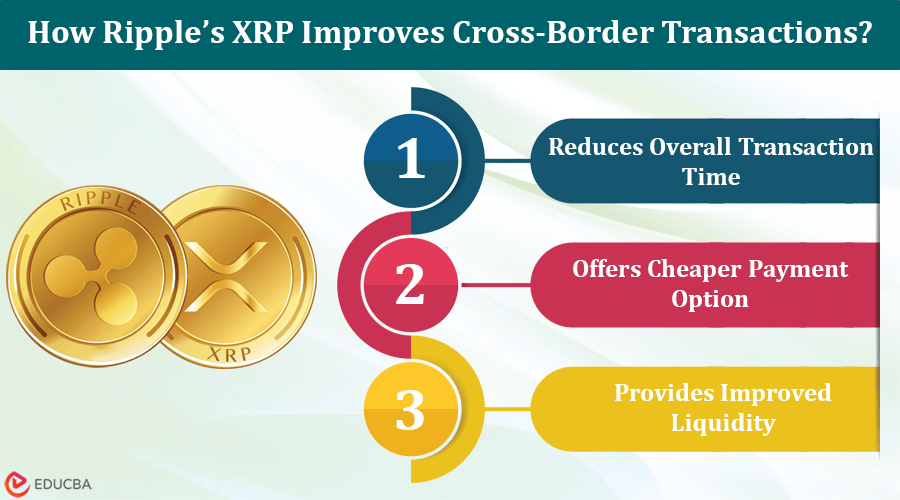What is Ripple in Blockchain?
Ripple is an online payment system that uses blockchain to allow users to make cross-border transactions faster and at a low cost. Unlike Bitcoin and other cryptocurrencies, Ripple in Blockchain is not entirely decentralized. It means a group of selected individuals operate and validate the transactions.
Ripple’s success stems from its use of blockchain technology. What makes Ripple’s transactions quick and efficient is the use of a consensus algorithm rather than traditional mining, like in Bitcoin proof of work. Moreover, Ripple in blockchain also uses smart contract functionalities, which makes it more versatile than other payment systems. This combination of speed, efficiency, and advanced capabilities makes Ripple a prominent player among blockchain-based solutions.
Ripple’s cryptocurrency, called XRP, is the foundation on which the Ripple network works. XRP is also useful for investment and trading purposes on cryptocurrency exchanges. However, when it comes to crypto, you can’t just trust your gut! Learn about investing at Immediate Jfusion and make informed decisions.
Table of Contents
- What is Ripple in Blockchain?
- Impact on Cross-Border Transactions
- Rise in the Financial Sector
- Future of Ripple in Blockchain
Ripple’s Impact on Cross-Border Transactions
Companies and individuals face delays, inefficiencies, and substantial costs while making cross-border transactions. However, Ripple in blockchain has become an excellent solution to these hurdles, providing a swift and cost-effective alternative.
The Ripple network works on its own cryptocurrency called XRP. XRP is a unique system that makes transactions fast and efficient and helps Ripple simplify the process of cross-border payments. It has various uses, such as instantaneous settlement, transparent tracking, acting as a liquidity source for financial institutions, etc. This innovative approach diminishes the overall transaction time, offering a more seamless and efficient cross-border payment experience for users globally.
Ripple in Blockchain – Rise in the Financial Sector
➔ Partnerships and Collaborations
Ripple has strategically cultivated partnerships with a diverse array of financial institutions on a global scale. These collaborations improve Ripple’s credibility and allow seamless integration of its technology into existing financial networks. Furthermore, these noteworthy alliances with prominent banks and financial service providers have made Ripple a key player in the financial industry.
➔ Regulatory Challenges and Compliance
Whichever financial field you work in, navigating regulatory hurdles is always a built-in aspect. Even Ripple has encountered its share of challenges. Ripple has addressed these issues through strategic involvement in regulatory partnerships and initiatives.
By committing to compliance, Ripple has successfully reduced its regulatory risks. It has also become a pivotal contributor to ongoing digital asset discussions within the regulatory landscape.
➔ Criticisms and Controversies
Despite its successes, Ripple has not been without criticisms and controversies. As it is less decentralized than other blockchain networks, the blockchain community has raised concerns regarding how secure the network is.
There have also been legal disputes about Ripple operating a securities exchange without proper oversight. However, Ripple has consistently responded to these concerns, implementing measures to address centralization and engaging in transparent communication to navigate legal challenges.
Future of Ripple in Blockchain
Ripple’s future appears dynamic. Ripple is well-positioned to play a crucial role in shaping the future of financial transactions. The ever-evolving cryptocurrency landscape opens possibilities for further innovation. As blockchain technology continues to mature, Ripple’s commitment to efficiency and cost-effectiveness makes it a key player in the digital financial industry.
Final Thoughts
Ripple’s rise signifies a pivotal moment in the evolution of financial transactions. Ripple in blockchain, powered by the XRP Ledger, has addressed long-standing challenges in cross-border payments. Through strategic partnerships, compliance efforts, and responses to criticisms, Ripple has solidified its position in the financial sector. As we look to the future, Ripple’s continued innovations and adaptability will surely contribute to the ongoing reshaping of financial transactions globally.
Recommended Articles
If you found this article on Ripple in blockchain interesting and informative, consider reading these recommended articles.

